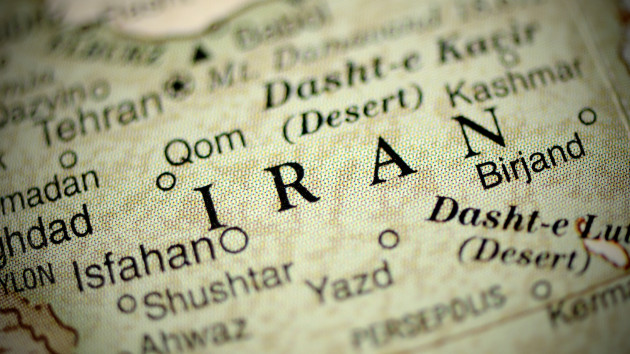Iranian rappers voicing support for protests face regime’s crackdown
(NEW YORK) — Iranian rap music has become a vehicle for criticism of the regime amid ongoing protests in the country, placing several rap stars in the crosshairs of government forces.
The protest movement sparked by the arrest and death of Masha Amini in September has led to at least 15,000 arrests by the Islamic regime, according to the United Nations. Those arrested include athletes, actors and at least three prominent rap artists.
At least 458 protesters have died amid the violent government crackdown, according to the Iran Human Rights organization.
Rap music is a popular form of music in Iran — a country where poetry is woven into the fabric of society and the famed 13th century Persian poet Rumi is quoted by young, old, poor and rich.
Words can be interpreted in multiple ways and rap music’s staccato verbal acrobatics lend themselves naturally to a form of speech that invites political and social commentary, experts say.
“The population in Iran is super young and rap music is their most popular form of music but yet rap music has never received an official permit by the Iranian government,” said Nahid Siamdoust, a professor of Middle Eastern Studies at the University of Texas. “It is because the very format of rap is understood to be protest music. Some of the tracks that have been produced in the last 15 years have been critical of the regime.”
Here are some of the prominent rappers who have been detained:
Toomaj Salehi
Salehi’s music frequently touches on the corruption of rulers and the regime’s suppression of dissent, also shaming the regime’s apologists who “whitewash” the Islamic Republic’s crimes.
“Regime officials and apologists kids living abroad. Has the kid taken his American vaccine? Use it when its available. Is it fair? Sure it is,” he raps in the song “Torkamanchay.”
The line is a response to Supreme Leader of Iran Ali Khamenei banning the import of Covid-19 vaccinations saying American and British vaccines are harmful.
“Toomaj came out of nowhere very suddenly and became very popular very quickly,” said Siamdoust, who authored the book Soundtrack of the Revolution: The Politics of Music in Iran. “So by now everyone knows his name. Most Iranians who are on social media following the protest movement know him.”
Despite getting arrested and released in 2021 for releasing songs critical of the government, Salehi has continued to post music videos expressing his opposition to the Iranian regime. Right before his latest arrest in October, he did an interview with the Canadian Broadcasting Corporation criticizing the regime.
“There is no such thing as reform,” Toomaj told the CBC. “You are dealing with a mafia that is ready to kill an entire nation, in order to keep power, money and weapons in its hands.”
A few days after this interview, Toomaj was arrested and charged with “moharbeh,” a crime which translates into “waging war against god” under Sharia law. He could face execution.
Saman Yasin
On Oct. 2, Yasin, a popular 24-year-old Kurdish rapper was detained by Iranian security forces at his home.
Iranian state media reported on Oct. 29 that he was also charged with moharbeh and “assembly and collusion with the intention of acting against the security of the country” for allegedly firing a gun into the air, a claim that his lawyer, Ismail Begi, denied, telling news outlet Shargh Daily there is no proof he owned a gun.
Yasin has also publicly voiced support for the nationwide protests. One of his songs, “Hajji,” discusses a previous arrest and his alleged torture by the Iranian government.
“They’ve turned me crazy. They’ve searched me. They treat me like an animal,” he raps in the song.
His family has pleaded for his release.
“I beg people…everyone, to help me save my son,” said his mother in a video published on social media.. “My son’s an artist, not a rioter.”
Some on social media have expressed concern about his situation after he was reportedly transferred from Evin to Rajai Shahr Prison in Karaj about two weeks ago, which could signal an imminent execution, the Kurdistan Human Rights Network reports.
Behrad Ali Konari
Konari is another rapper who was arrested amid the protests and is reportedly facing execution. Like Salehi and Yasin, he addresses social and political issues under the Islamic Republic. His music tackles everything from morality police to censorship and economic corruption.
In a music video for his song “Mr. President,” Konari played a presidential candidate who is giving promises.
He raps, “If you vote for me, I’ll make water and bread free. For clothing then no one will be tricked. Any idea on media suppression? That would be easy, the national internet.”
Salehi and Konari are currently facing charges of “corruption on earth” and “waging war against God,” or “moharebeh,” both severe crimes based on Sharia law and punishable by execution. Yasin is the only one of the three who has been convicted of his crimes.
Iran executed two protesters over the past week on charges of moharebeh. Mohsen Shekari was executed on Dec. 8, and Majid Reza Rahnavard was executed on Dec. 12. Neither Rahnavard nor Shekari was allowed to appoint their own lawyers.
Amnesty International has condemned the reported executions in Iran and requested the Iranian judiciary stop the “grossly unfair sham trials” and death sentences.
But death sentences and detentions haven’t stopped rappers in Iran from continuing their vocal criticism of the government. Even as he sits inside a prison, Toomaj’s official Twitter account is still active, likely being run by someone from his team. It recently tweeted a defiant message to his half-million followers.
“The awakened nation cannot be silenced, we don’t just chant slogans, in practice we are behind each other with strength until victory,” he wrote.
Copyright (C) 2022, ABC Audio. All rights reserved.

